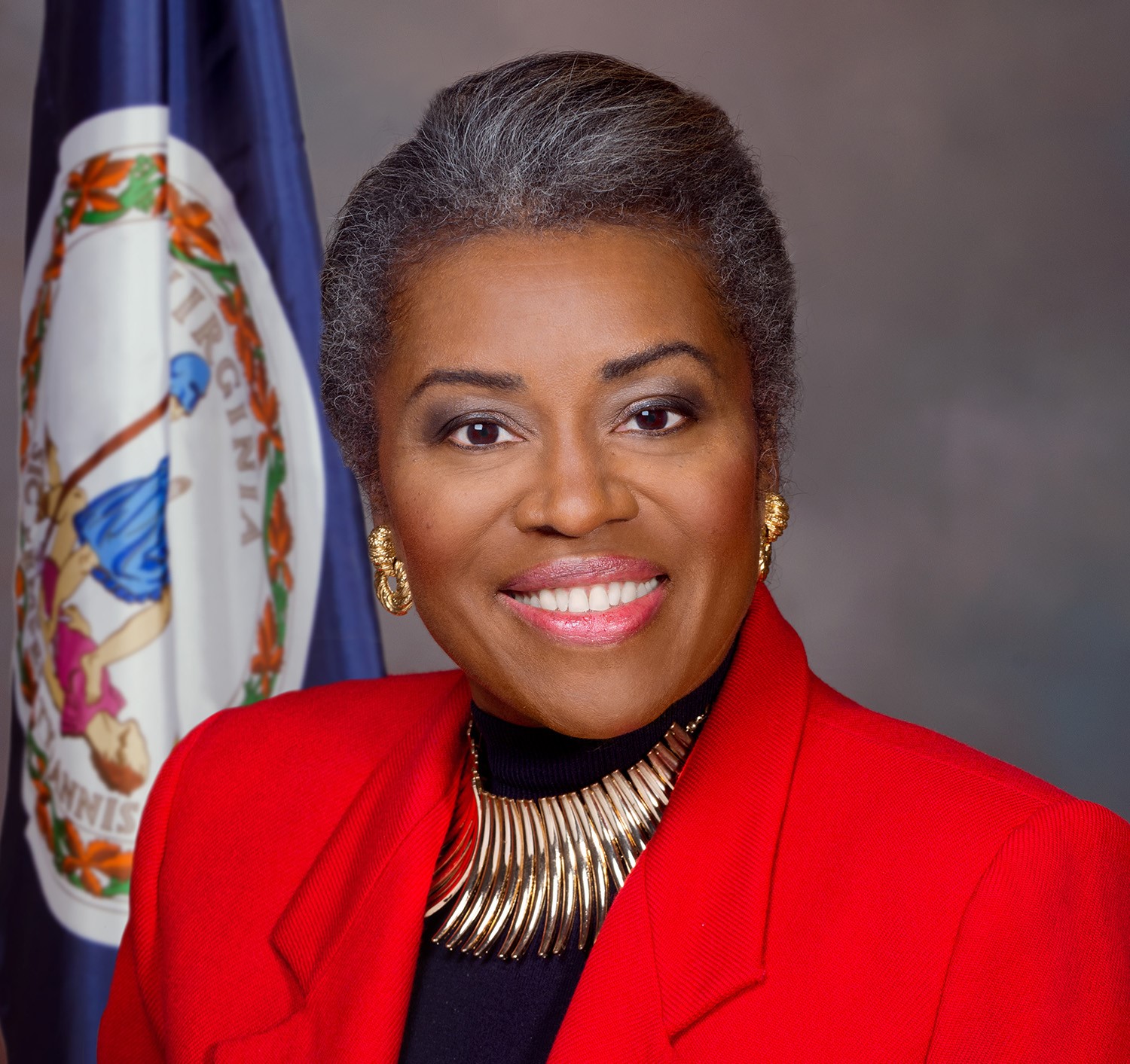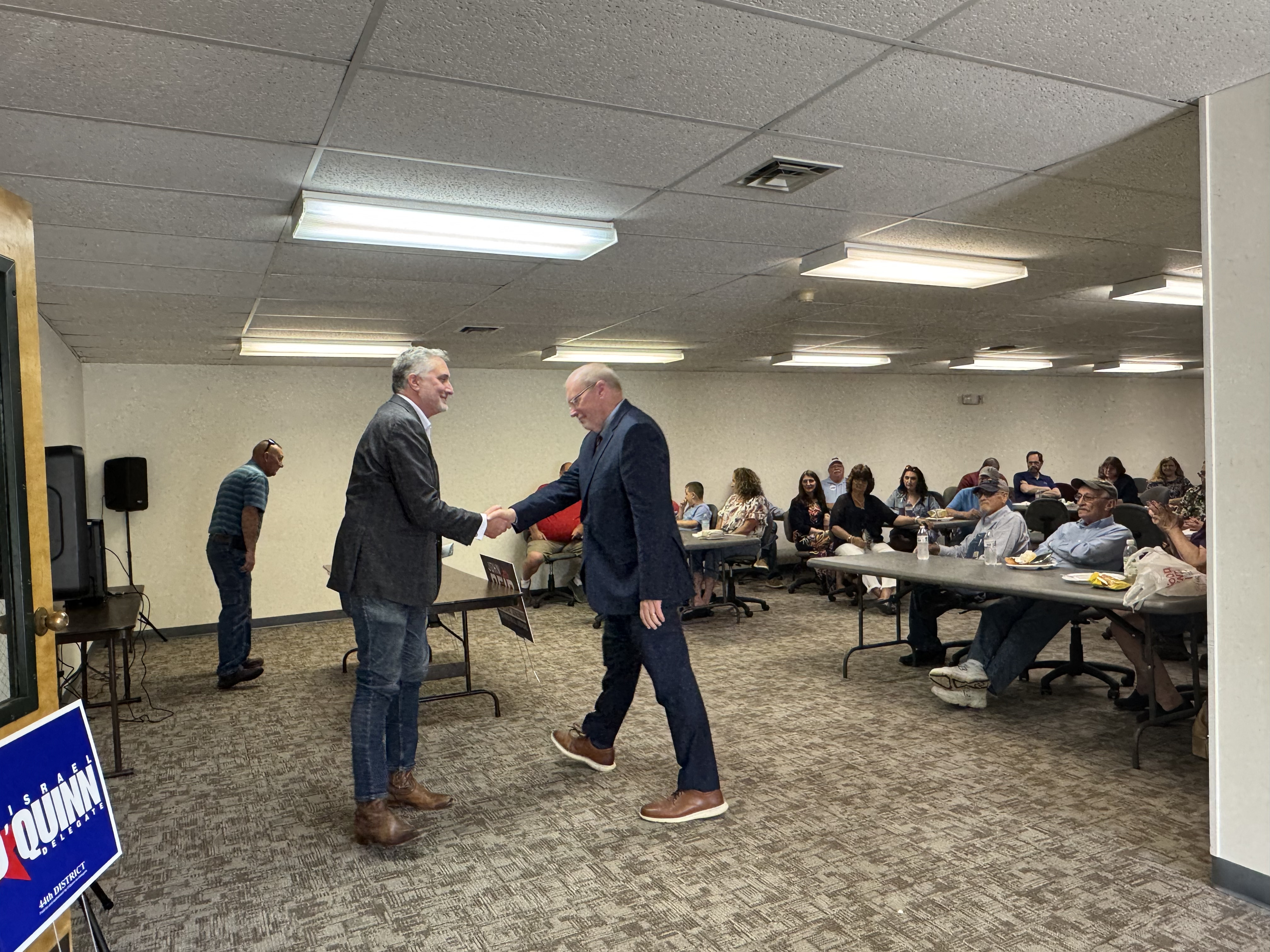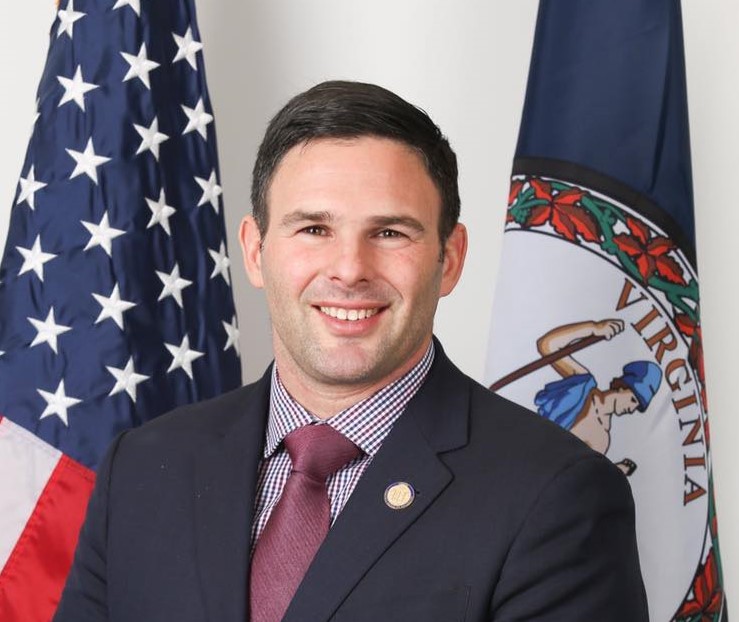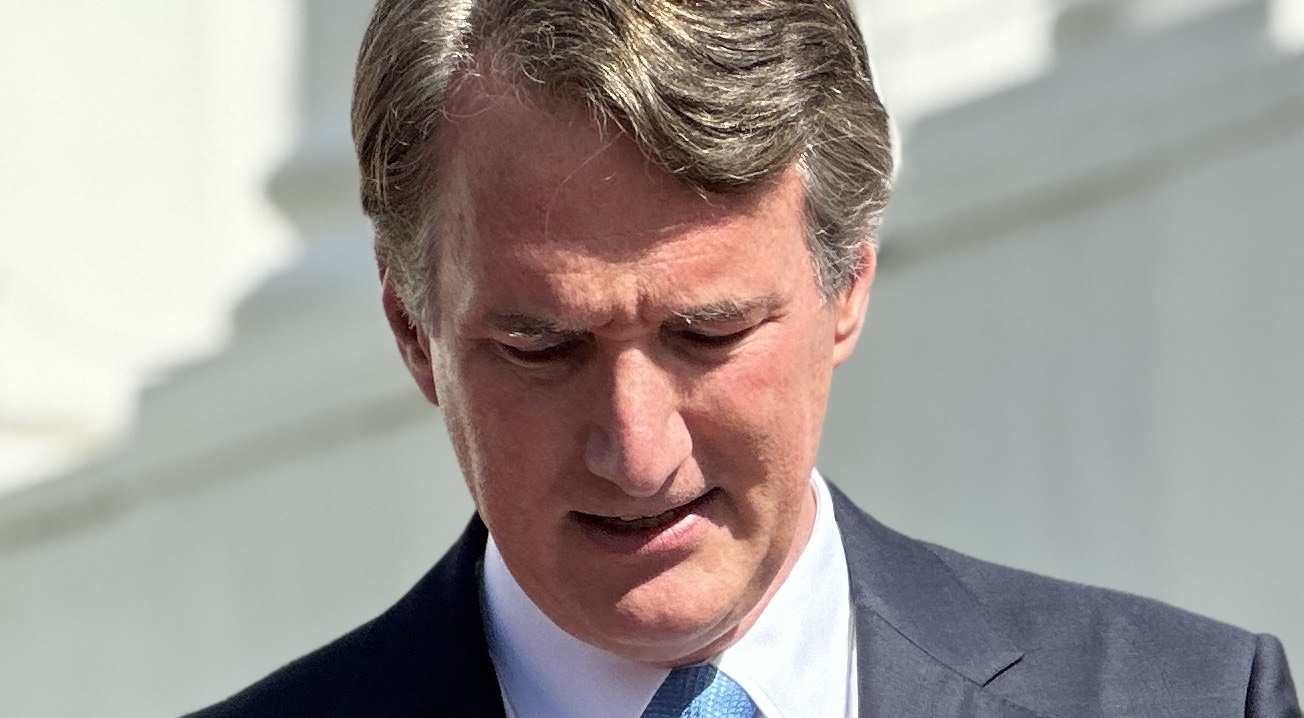Gov. Glenn Youngkin blinked.
Then Lt. Gov. Winsome Earle-Sears blinked.
That’s my read on the past 48 hours in Virginia politics as the controversy over Republican lieutenant governor candidate John Reid may now have reached its end point with Reid still very much on the party’s ticket.
In case you’ve been blissfully out in the woods without Wi-Fi for the past week, here’s the briefest of recaps: Last Thursday, Youngkin became aware of a social media account with Reid’s longtime screen name that since at least 2014 has been posting photos of nude male models. On Friday, Youngkin told Reid he should drop out of the race. Reid said the account wasn’t his, refused to drop out, and the whole thing became public, setting off unexpected turmoil on the Republican side of this year’s statewide races. Further, over the weekend Reid accused Youngkin’s top political adviser, Matt Moran, of “extortion” and sent a “cease and desist” letter. (Moran has said “the accusations against me are unfounded” and released a sworn statement that gives his account of the controversy.) Most Republican leaders remained silent until Tuesday, when Youngkin said it was up to Reid to decide whether to stay on the ticket, and Earle-Sears chimed in agreement.
As a factual matter, it’s always been Reid’s choice whether to stay on. He is the party’s lawful nominee and there is no provision, either in the party rules or state law, for the party to withdraw that nomination. Reid says he’s not going anywhere, so this may be the end of the matter, at least in terms of a daily firestorm that has had political junkies across the state furiously refreshing their social media feeds to see if there’s anything new.
Earlier this week I wrote 10 things to know about the John Reid controversy. Today, let’s catch up with eight more things to know.
1. These are not exactly strong endorsements of Reid.

“The decision is John‘s and up to John,” Youngkin said. Earle-Sears said much the same about Reid: “It is his race and his decision alone to move forward. We all have our own race to run.”
Let’s get the obvious out of the way: Neither of these statements demand that Reid quit the race, so to that extent they represent a certain deescalation of the situation — especially on the part of Youngkin, who had privately called on Reid to drop out. But neither of these constitutes what would be called a full-throated endorsement.
Earle-Sears’ statement that “we all have our own race to run” is factually true — in Virginia the governor and lieutenant governor are elected separately — but also raises the question of how strong the embrace between the candidates will be. Over the years, we’ve had some tickets that ran more coordinated campaigns than others. This one sounds like it won’t be.
There was supposed to be a ticket-wide rally Wednesday evening in Henrico County. Instead, it turned into a Reid-only event while Earle-Sears threw out the first pitch at the Richmond Flying Squirrels baseball game. Will we ever see all three Republican candidates (Attorney General Jason Miyares is the third) together? I’m sure that a few days after the June 17 Democratic primary, Democratic gubernatorial candidate Abigail Spanberger will be standing with the winners of the party’s primary for lieutenant governor and attorney general, holding hands in the air and declaring that whatever ticket has emerged is the perfect one for Virginia. Will we ever see Republicans do the same? The absence of that may become awkward. At least for now, though, the temperature of this political crisis has been turned down some.
2. Some religious conservatives remain uncomfortable with Reid.
Maybe that was always going to be the case (Reid is openly gay), but this controversy has accentuated those objections. The Family Foundation and the leader of Concerned Women for America wanted Reid to quit. So did former Rep. Bob Good, R-Prince Edward County, who comes out of that particular part of the Republican Party. What are those voters going to do? Will they skip that race on the ballot, even though that would give an advantage to a Democrat whose views are quite counter to their own? Will they sit out the election altogether, which would hurt the whole statewide ticket and local Republican candidates down ballot?
Earle-Sears may say “we all have our race to run” but, politically speaking, she needs Reid and Reid needs her. Earle-Sears in the past tried to distance herself from Trump; Reid has not. For any Republicans who believe that Earle-Sears is insufficiently loyal to Trump, Reid offers an antidote. Meanwhile, to the extent that Earle-Sears is strong with religious conservatives, Reid could use those voters. If Republicans are to win this year, their margin will be quite small (as it was four years ago). None of these candidates has much margin for error. The lack of a unified front could be a problem for Republicans.
3. The most conservative part of Virginia might have saved Reid.

This is more speculation than a statement of fact, but hear me out. Reid’s first public appearance after the controversy broke was in Southwest Virginia — specifically, Washington County, a county that voted 76% for Donald Trump last year. If there was a part of Virginia that was likely to react negatively to a gay Republican embroiled in a controversy over nude photos (which, again, are on a social media account that Reid says isn’t his), it would be in a rural, conservative county. Instead, Washington County Republicans greeted Reid warmly and the region’s congressman, Rep. Morgan Griffith, had no problem shaking Reid’s hand and urging support for the whole ticket. Only Cardinal News and The Washington Post had reporters there to document the event, but those stories of Reid’s positive reception were spread statewide. Our story got an unusual amount of traffic for one posted on the weekend, which is typically a low-traffic time online.
Reid had other appearances later in Northern Virginia where he was also greeted warmly, but let’s consider a counterfactual scenario: What if Reid had gone to Washington County and been greeted with silence or outright hostility? What if Griffith had suddenly found some reason to cancel his appearance to avoid being seen with Reid? That would have sent a very different signal to the rest of the state than the one that was sent, which was that, on the ground, nobody really seemed to care about the controversy.
Instead, Reid got credit for showing up and some Republicans in Washington County groused that Earle-Sears didn’t. She attributed her cancellation to weather problems (it was generally clear but breezy). This is the second time this year she’s canceled a trip to Abingdon. Voters in Southwest Virginia, regardless of party, reward candidates who show up and remember those who don’t.
4. This has echoes of Doug Wilder in 1985.
In 1985, Democrats had a candidate for lieutenant governor that many party leaders were uneasy about: Doug Wilder. Whatever they thought of Wilder personally, they worried how a Black candidate would go over with what then was a strong Democratic base of rural white voters. Wilder went to Southwest Virginia on a highly publicized campaign swing and quickly allayed those concerns. Even then, there were persistent questions at how more conservative leaders in his party — such as House Speaker A.L. Philpott of Henry County — would react to Wilder. Those questions put a spotlight on Wilder that played to his advantage. While no two elections are ever the same, it’s possible Reid might actually benefit from all this just as Wilder did in 1985. It’s certainly fair to say that right now he has higher name identification than many of the candidates seeking the Democratic nomination for lieutenant governor, and that probably wasn’t the case last week this time.
5. This also has echoes of 1977.
That year both parties nominated tickets that they weren’t entirely comfortable with. Republican gubernatorial candidate John Dalton pushed Walter Craigie, a former state finance secretary and state treasurer, for the lieutenant governor’s nomination. Convention delegates went with state Sen. Joe Canada instead.
The more awkward arrangement was on the Democratic side, where the primary produced a ticket with a liberal (Henry Howell) for governor, a moderate (Charles Robb) for lieutenant governor and a conservative (Ed Lane) for attorney general. Democrats tried to make the most of the unusual — some might say unnatural — lineup by branding it as “the Rainbow Ticket” long before the phrase “rainbow coalition” had its modern meaning. There were campaign buttons (campaigns still had actual buttons then) that played up the rainbow theme.
In the end, voters rendered a split decision. Dalton did not get even his second place choice for lieutenant governor, he got a Democrat. Meanwhile, both the left and right wings of the Democratic ticket got clipped, with Howell and Lane losing. Those results may hold no lessons for today, but the unease that Democrats had with some of their ticketmates in 1977 does vaguely resemble some of the unease with the Republican ticket today.
6. This calls more attention to Helmer’s Law that essentially bans conventions.

Reid is something of an accidental Republican nominee. Only two candidates filed for the Republican primary: Reid and Fairfax County Supervisor Pat Herrity. When Herrity dropped out due to health issues, that left Reid as the only candidate on the ballot, so he automatically became the Republican nominee. Maybe he’d have won the primary anyway, maybe he wouldn’t have — we have no idea, but the point is he got nominated because he was the only candidate left on the ballot.
If Republicans had held a convention to nominate their candidates, that convention likely wouldn’t have happened yet, and more candidates might have come forward after the Tumblr controversy. So why didn’t Republicans hold a convention? They can’t.
In 2021, the General Assembly passed a bill sponsored by Del. Dan Helmer, D-Fairfax County, that essentially requires parties to hold state-run primaries to nominate their candidates. The key word there is “essentially.” Helmer says it’s not a 100% ban, but the state Republican Party’s counsel, and Miyares in a formal opinion, have said primaries are the only way to satisfy the legal requirements that “Helmer’s Law” lays out on accommodating voters who can’t physically be present at a convention or mass meeting. Lynchburg Republicans have filed suit to challenge that law. For those Republicans who wish they could hold conventions, this controversy gives them another talking point.
7. Moran says that an ‘outside group’ discovered the social media account in question as part of a standard background check
The initial story, from The Richmonder, said “GOP researchers” had found the Tumblr account, raising the specter that it was Youngkin’s political team that had come up with the information about the social media account using Reid’s screen name. Reid’s “cease and desist” letter specifically targeted longtime Youngkin political adviser Matt Moran. In a sworn statement that Moran released on social media Wednesday, he said disputed the way that events have been characterized. He said that he had been “actively assisting” Reid’s campaign manager. On April 22, Moran said in his affidavit, “I connected him with an outside group to discuss basic things campaigns do, including that a vulnerability report — of which his campaign had full knowledge — was being started by the outside group, solely based on the fact that John was a radio show host with an extensive history of public comments.”
Moran said that on April 24 he “recieved preliminary information from the third-party vulnerability study” and that “other political individuals and organizations were aware of this information.” On Friday morning, April 25, Moran said he “received a written summary of the study findings, containing information from a Tumblr account, which would put John in a negative light and impact the viability of his candidacy regardless of its veracity.” Moran said he shared this with Reid “only after expressing personal concern for him.”
This squares with what state Sen. Mark Peake, R-Lynchburg and the new chair of the state Republican Party, said Wednesday morning. In an interview on WLNI-FM in Lynchburg, Peake said he believed the information about Reid was turned up by some out-of-state conservative group that was conducting research on Republican candidates to figure out who to invest in and who to stay away from. “I believe that’s what happened in this case,” Peake said.
Would Republicans have done opposition research on their own candidate? Yes, that kind of thing does happen. Parties and interest groups want to know what kind of attacks they might face from the other side. Here’s one example: Back in the pre-internet days of 1987, Roanoke Republicans were curious about an unknown candidate who had popped up to seek their party’s nomination for the state Senate, so they researched his background. They discovered he had fathered a child out of wedlock and had been sued for credit card debt, both of which were bigger scandals then than they would be now. Republican leaders presented the candidate with the information, thinking he’d be quietly persuaded to step aside. He did not; he called a news conference, revealed the information himself and attacked party leaders. Does this sound familiar?
8. Youngkin discovers the limits of his power.

In Washington, we have a president who is testing the limits of executive power. In Richmond, we have a governor who has just discovered the limits of his. Youngkin has been a popular figure among Republicans, as winning politicians often are, but the rap against him from even Republican legislators is that he’s too much the corporate CEO who treats them as underlings and not as a co-equal branch of government. He discovered that the hard way with the proposed Alexandria arena deal; just him saying that plan was a good bargain for the state wasn’t enough to persuade legislators. Perhaps if he had schmoozed more with them, they’d have seen things differently.
In this case, Youngkin has discovered something else that previous governors of both parties have discovered, to their chagrin: The closer a governor gets to the end of his term, the less political power he has. Every Republican legislator hopes to be in Richmond after Youngkin has gone (and every Republican state senator will be, given how the terms are staggered). Youngkin’s political instincts may well be right — that the dispute over the Tumblr account will be a distraction for Republicans — but Republican legislators don’t feel beholden to him. They’re either looking out for their own reelection campaigns or are focused on making sure that Earle-Sears wins. I’m sure many wanted no part of this controversy and stayed silent, waiting to see how things would play out. However, if they felt strongly that this would hurt them, or the ticket, they’d have likely spoken up. They did not. Youngkin took a stand and found he had few followers, at least publicly.
What’s more damaging here — that Youngkin wanted Reid out, or the photos of nude male models on the now-deleted Tumblr account that Reid says wasn’t his? We don’t know. The only thing we really know is that Republicans should be fortunate that this news broke in April and not October. If we’re still talking about this in October, that’s bad news for Republicans, but there are still six months to go and that’s plenty of time for other things to crowd their way into the conversation.
To see who’s running this year, see our Voter Guide. Want more politics and analysis? Sign up for West of the Capital, our weekly political newsletter:



